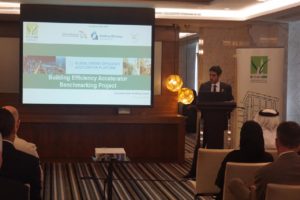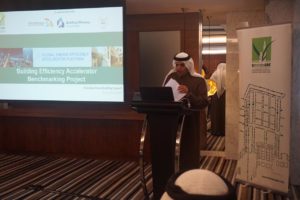Report establishes industry baseline for hotels, schools and malls to evaluate their energy and water performance, says EmiratesGBC
Dubai, UAE, 13 January 2019: While several schools, malls and hotels in Dubai have achieved high levels of energy and water-use efficiency, others need to step up their sustainability commitment, to ensure they are aligned with the sustainable development vision of the nation, says Emirates Green Building Council (EmiratesGBC), while revealing the results of the Building Efficiency Accelerator (BEA) Project Report, in a Press communiqué.
The BEA project is led by the World Resources Institute (WRI) under the UN programme, Sustainable Energy for All (SEforAll), which aims to accelerate implementation of building efficiency policies and programmes, and double the global rate of improvement in energy efficiency by 2030, the communiqué said.
Dubai is the first and only city in the Middle East committed to the BEA, and EmiratesGBC is serving as the BEA City Liaison in partnership with Dubai Supreme Council of Energy (DSCE) to evaluate the energy performance of hotels, schools and malls in the city, the communiqué further said. EmiratesGBC’s BEA team assessed the energy and water performance of existing buildings against similar buildings within the same typology, as part of the study since January 2018, the communiqué also said. A total of 121 properties, including 85 hotels, 27 schools and 9 malls, submitted data on their energy and water use, the communiqué added.
The BEA project findings demonstrate performance disparity in all three groups. The study revealed that the best hotel and hotel apartment performers consume 58% less energy and 65% less water per unit area than the worst performers in the category, the communiqué said. Older hotels are likely to consume more energy and water per unit area, further highlighting the importance of retrofits, the communiqué further said. Higher star-rated hotel properties are also likely to consume slightly more energy and water per unit area, with hotels and hotel apartments consuming 12% less energy and 36% less water, on average, per area than resorts, the communiqué added.
The best performers among schools consume 61% less energy and 84% less water per unit area compared to the worst, with newer schools likely to be higher consumers of energy and water, the communiqué said. The report also indicates that schools rated higher by the Knowledge and Human Development Authority (KHDA) were likely to consume less energy per unit area, the communiqué said. Among malls, the lowest consumer uses 35% less energy and 58% less water per area compared to the highest consumer, the communiqué also said.

Saeed Al Abbar, Chairman, EmiratesGBC
Saeed Al Abbar, Chairman, EmiratesGBC, said: “The project’s main objectives is to promote energy efficiency within Dubai’s existing building stock by providing performance benchmark data to the industry and public sector. We believe this will provide vital information on the performance of existing buildings to policy makers and building owners and will accelerate the uptake of energy retrofits. The findings reveal that there is a strong potential for savings and operational efficiencies that can be achieved through remedial actions such as audits, retrofits, energy management and the use of awareness campaigns or trainings to drive changes in behaviour. The report also highlights the importance of deep retrofits as a substantial measure in advancing towards 100 per cent Net Zero Carbon Buildings by 2050 and to achieve the goals of the Paris Agreement of keeping global warming well below two degrees C.”

H.E. Ahmad Muhairbi, Secretary-General, Dubai Supreme Council of Energy
H.E. Ahmad Muhairbi, Secretary-General, Dubai Supreme Council of Energy, said: “Energy sustainability has come to the top of the agenda of the Dubai Government, driven by the visionary leadership of H.H. Sheikh Mohammed Bin Rashid Al Maktoum, Ruler of Dubai. We thank the EmiratesGBC for working with us, on meeting our goals within the Accelerator. One of the results of this work is launching of several initiatives within the government, and this publication in particular comes as one of the key deliverables with a broad application to demonstrate joint work between the public and the private sector.”
The BEA project report provides easy to adapt recommendations for facility managers, operators and building owners to assist them in accurately measuring their buildings’ performance, the communiqué said. Among the recommendations is the importance of having a sufficient number of sub-meters within malls to track and measure energy and water use, the communiqué further said. The report recommends building on Dubai’s existing strategies and policies to encourage benchmarking across all types of buildings, the communiqué also said. This will help future mandates for building audits and retrofits for poor performing buildings, thereby paving the way for decarbonisation and net zero buildings, the communiqué added.
According to EmiratesGBC, it will provide the participating hotels, schools and malls with tailored scorecards to highlight the performance of the properties, and to support them in deciding where urgent action is needed to increase efficiency and building performance.
Copyright © 2006-2025 - CPI Industry. All rights reserved.